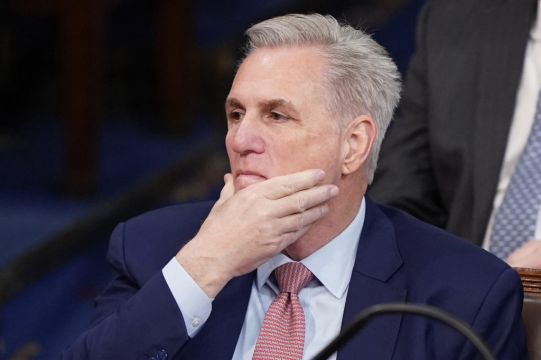Republicans have flailed through a second day of multiple balloting, unable to elect their leader Kevin McCarthy as House speaker or come up with a new strategy to end the political chaos that has tarnished the start of their new majority.
For a fourth, fifth and sixth time, Republicans tried to vote Mr McCarthy into the top job as the House plunged deeper into disarray. But the votes were producing almost the same outcome, 20 conservative holdouts still refusing to support him, and leaving him far short of the 218 typically needed to win the gavel.
In fact, Mr McCarthy saw his tally slip to 201, as one fellow Republican switched to vote simply present.
Seeing no quick way out of the political standoff, Republicans voted abruptly late on Wednesday to adjourn as they desperately searched for an endgame to the chaos of their own making. They were due back at 8pm.
“Well, it’s Groundhog Day,” said Kat Cammack in nominating Mr McCarthy on the sixth ballot.
She said: “To all Americans watching right now, We hear you. And we will get through this — no matter how messy.”
But the right-flank conservatives, led by the Freedom Caucus and aligned with Donald Trump, appeared emboldened by the standoff — though Mr Trump publicly backed McCarthy.
“This is actually an invigorating day for America,” said Byron Donalds, who was nominated three times by his conservative colleagues as an alternative. “There’s a lot of members in the chamber who want to have serious conversations about how we can bring this all to a close and elect a speaker.”
Mr McCarthy, the California Republican, vowed to keep fighting despite the gruelling spectacle, unlike any in modern times, that threw the new majority into tumult a day earlier. Animated private discussions broke out on the chamber floor between McCarthy supporters and detractors searching for an endgame.
The House had initially gavelled in at noon, and a McCarthy ally quickly re-nominated him for the job with a rousing speech designed to peel off detractors.
“Sure, it looks messy,” said Mike Gallagher.
“But democracy is messy. The American people are in charge.”
Mr McCarthy himself entered the chamber saying: “We’ll have another vote.”
But the dynamic proved no different from Day One, as Democrats re-upped their leader, Hakeem Jeffries, for speaker, and a right-flank leader from the Freedom Caucus offered a challenge to Mr McCarthy – nominating Mr Donalds in another history making moment. Both Mr Jeffries and Mr Donalds are black.
“This country needs leadership,” said Chip Roy, the Texas Republican noting the first time in history two black Americans were nominated for the high office, and lawmakers from both parties rose to applaud.

It was the first time in 100 years that a nominee for House speaker could not take the gavel on the first vote, but Mr McCarthy appeared undeterred.
Instead, he vowed to fight to the finish, encouraged, he said, by Mr Trump to end the disarray and pull the Republican Party together.
Early on Wednesday, Mr Trump publicly urged Republicans to vote for McCarthy: “Close the deal, take the victory,” he wrote on his social media site.
He added: “Republicans, do not turn a great triumph into a giant and embarrassing defeat.”
The tumultuous start to the new Congress pointed to difficulties ahead with Republicans now in control of the House.
Tensions flared among the new House majority as their campaign promises stalled out. Without a speaker, the House cannot fully form — swearing in its members, naming its committee chairmen, engaging in floor proceedings and launching investigations of the Biden administration.
Lawmakers’ families had waited around, as what is normally a festive day descended into chaos, with children playing in the aisles or squirming in parents’ arms.
But it was not at all clear how the embattled GOP leader could rebound to win over right-flank conservatives who reject his leadership.
It typically takes a majority of the House to become speaker, 218 votes — though the threshold can drop if members are absent or merely vote present, a strategy Mr McCarthy appeared to be considering.
Mr McCarthy won no more than 203 votes in three rounds of voting, losing as many as 20 Republicans from his slim 222-seat majority.
Not since 1923 has a speaker’s election gone to multiple ballots, and the longest and most gruelling fight for the gavel started in late 1855 and dragged out for two months, with 133 ballots, during debates over slavery in the run-up to the Civil War.
“Kevin McCarthy is not going to be a speaker,” declared Republican Bob Good, one of the holdouts.
A new generation of conservative Republicans, many aligned with Mr Trump’s Make America Great Again agenda, want to upend business as usual in Washington, and were committed to stopping Mr McCarthy’s rise without concessions to their priorities.
President Joe Biden later said House Republicans’ inability to unify behind a speaker candidate is “not a good look” for the country.
Speaking at the White House before traveling to Kentucky for an event to highlight last year’s bipartisan infrastructure law with Senate Minority Leader Mitch McConnell, Mr Biden said of Republicans: “I hope they get their act together.”
He declined to say whether he had any choice for the speaker job, adding “I have no idea” who will prevail.







